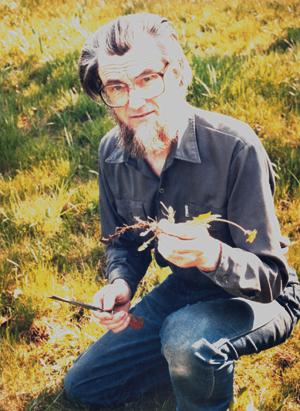A Naturalist's View of Pesticides
 I'm sure you feel overwhelmed these days with worries about ozone holes, greenhouse effect,
acid rain, species extinction, and other globe-wide symptoms of environmental stress. And, feel
helpless - what can one person do about such huge and impossibly complex problems?
I'm sure you feel overwhelmed these days with worries about ozone holes, greenhouse effect,
acid rain, species extinction, and other globe-wide symptoms of environmental stress. And, feel
helpless - what can one person do about such huge and impossibly complex problems?
Well, most of the environmental problems this earth faces are attitude problems. Our attitudes.
They have to be corrected one mind at a time. And so, you can do something.
Pesticides are designed to reduce biodiversity, they are designed to kill living things, and that's
what people buy them for. Yet, "the biological diversity that comprises variability of genes,
species and ecosystems is the world's most valuable resource for the sustainability and welfare
of all humankind" according to the environment ministers of the world.
Pesticides don't know when to stop killing. Diazinon, a common lawn spray aimed at turf insects,
is absorbed by earthworms but rarely kills them. A baby robin needs four meters of earthworms a
day to grow up. The dose that is non-fatal to the earthworm adds up to death for most baby
robins where it is used. If only one household in six uses diazinon, virtually all robins in your
community will die. So will the butterflies.
Pesticides often just create the 'need' for still more pesticides, rather than solving any problem.
Herbicides aimed at ragweed kill slow-growing clovers faster, so quick-sprouting ragweed takes
over along dry dusty road edges. Then, hayfever sufferers feel they need more herbicides to kill
the ragweed. If you have hayfever, clovers are your best friends - they not only compete directly
with ragweed for growing space, but improve soils so that grasses can move in and finish the
ragweed off for good.
Pesticides often kill the wrong things. Fungicides are absorbed by aphids, then are concentrated
in and kill the insects that eat the aphids, so aphid damage can promote still more fungal growth.
All carnivores must be more active than their prey, so nerve poisons aimed at aphids kill insects
that eat aphids, such as lady beetles, faster than the aphids themselves are killed.
I live in an urban area, as most do in Canada. Facing the street, my little lot shows a hedge laden
with red berries throughout the fall, and into the winter until a softly whistling flock of crested
brown cedar waxwings visit for a week. Rather than fight the roots of a shade-giving maple with
grass, the ground inside sparkles with crocuses, daffodils, ajuga, and lily-of-the-valley
throughout the spring and summer.
In the back yard, a small
pond
holds a pot of water lilies surrounded by water striders and swimming bugs beyond count. It has
supplied the surrounding neighbourhood with insect-eating toads for many years. A goldfish eats
all the mosquito larvae, but leaves most of the tadpoles. Four pairs of resident birds dispose of
earwigs and lawn grubs. Along one edge, an unmowed patch called the
meadow
is home to over a hundred different kinds of wild flowers.
You too can live the richness and diversity of the natural world, if you cooperate with it around
your home. Pesticide avoidance is a practical approach towards respect for all life that shares this
planet with us, a practical way to safeguard our health right now and for the future.
Respect for natural life means planting chives around aphid-attracting roses so ants won't protect
them, then washing off the few aphids that remain with a hose nozzle. It means using an
asparagus fork to dig up dandelions, aerating the soil to promote grass growth rather than killing
everything else. It means planting shrubs that provide fruit and shelter for birds as well as pretty
flowers. It means making apple sauce and fresh apple juice from some of your apples rather than
spraying them every few weeks so they all look perfect. It means dividing your vegetable patch
in four, to rotate the crops you grow, and scattering marigolds and nasturtiums throughout to
attract the bugs you don't want on your vegetables. It means understanding that the greater the
number of species that find your yard a healthy place to live, the healthier it will be for you too.
It's worth taking the time to learn to love this planet. And, while doing it, we may just learn to
like ourselves more too. Remember the last sermon of James, the brother of Christ: "Love
one another, little children." Before this universe, we are both children, you and I. Be a big
sister to this earth of ours. You'll stop using most pesticides when you do.
John Sankey
other notes on pesticides
 I'm sure you feel overwhelmed these days with worries about ozone holes, greenhouse effect,
acid rain, species extinction, and other globe-wide symptoms of environmental stress. And, feel
helpless - what can one person do about such huge and impossibly complex problems?
I'm sure you feel overwhelmed these days with worries about ozone holes, greenhouse effect,
acid rain, species extinction, and other globe-wide symptoms of environmental stress. And, feel
helpless - what can one person do about such huge and impossibly complex problems?